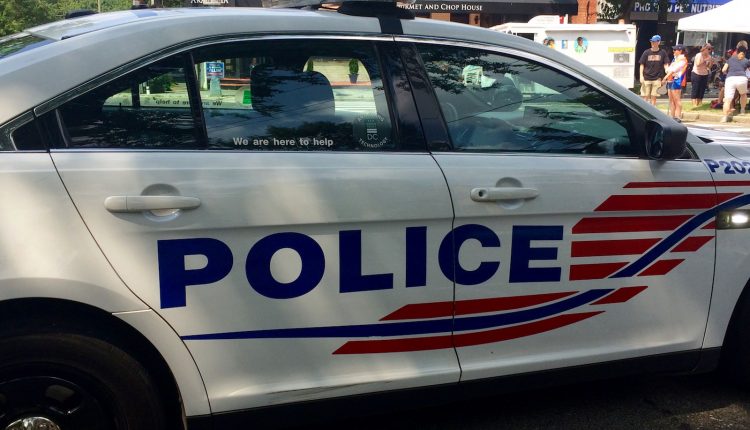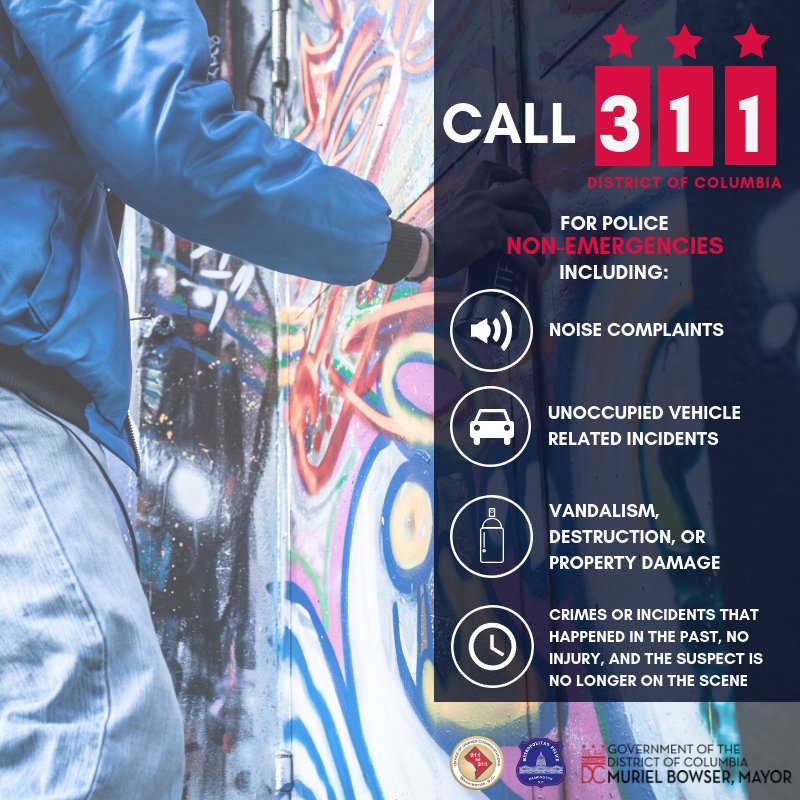
DC shifts to 311 for non-emergency police calls, capping a contentious history of policy changes
For many, calling 911 is an instinctual response anytime they need assistance or intervention from the police. But now, DC residents who need non-emergency police support are being told to call 311, per a recent policy change from the DC Office of Unified Communications.
City officials say the move will improve responsiveness and efficiency, but the announcement left some longtime residents frustrated over multiple policy changes that have led to confusion over which number to call in the years since 311’s introduction nearly two decades ago.
New fact sheets distributed — and tweeted — by the agency say to use 311 to lodge noise complaints, vandalism reports and traffic complaints regarding unoccupied vehicles, as well as to report past crimes that did not involve injury or incidents when the suspect is no longer present.

In recent years, the 311 number was used exclusively as a portal for people to request city services and obtain information — functions it will continue to serve. After reaching 311, callers should press “1” to reach an operator responsible for handling police non-emergency calls, with additional options available for other service requests. For instance, 311 will soon handle requests for maintenance issues for parks, playgrounds and DC public schools.
Meanwhile, 911 was — until recently — used for all incidents requiring a police response, regardless of whether they were an emergency. The Office of Unified Communications (OUC) operates both 311 and 911, which also handles calls from people needing help from the Fire and Emergency Medical Services Department.
In 2018 the city received 1.5 million 911 calls, of which one-fifth were for non-emergencies, according the OUC’s Jan. 17 press release on the change. The agency responded to calls in the order they were received, leaving urgent requests for services in line behind less pressing calls. The policy change is designed to prevent emergencies from getting deprioritized, city officials say.
“This helps us fulfill our mission to provide accurate and expedited service while responding to both the emergency and non-emergency needs of our residents and visitors,” OUC director Karima Holmes said in the press release.
The use of 311 in DC has changed several times since its introduction in 2000. The number was first used exclusively for reporting non-emergencies requiring a police response, with the city designating 202-727-1000 as the line for service and information requests involving other agencies, according to a 2011 report prepared by a DC Council committee. In 2008, the mayor’s office, under Adrian Fenty, changed the protocol to have 911 handle all calls for the police, with 311 taking only calls involving other agencies.
After the policy switch, police officers speaking at community meetings frequently fielded skeptical comments from local residents who said they didn’t want to tie up 911 with mundane requests, and the change also prompted concern among DC Council members that emergency calls were not being prioritized ahead of non-emergency ones.
In response, Council Chairman Phil Mendelson secured passage in 2012 of the 911 Purity Amendment Act, which mandated that 911 be used only for emergencies. Mendelson — who introduced the bill in 2011 when he was still an at-large council member and the chair of the Committee on the Judiciary — wrote in the bill’s 2011 committee report that the Fenty administration’s 2008 change was “detrimental to the government’s response, contrary to best practice in other public safety answering centers, and has resulted in public confusion.”
The matter was still not resolved, though. In 2013, The Current Newspapers reported that all calls requiring a police response, emergency or non-emergency, were still being funneled through a 911 operator. Mendelson said at the time that this system did not comply with the law, while the OUC maintained that it did.
With the newly adopted policy of channeling all police non-emergency calls to 311, OUC has returned 911 to its original function. The change went into effect the first week of December, according to a tweet by @311DCgov. An OUC spokesperson told The DC Line that the change was part of the broader “Safer, Stronger DC” initiative by the administration’s public safety agencies to review programs and services for efficiency.
In response to the DC government’s mid-January tweets on the subject, some residents expressed frustration with the repeated changes to the protocols for calls to 311, as well as the history of confusing messaging over the years.
“I don’t really care what they choose, just pick one and stick w/ it and if you change it, send individual mail/email to EVERYONE. It’s that important,” wrote DC resident Mindy Moretti, a former advisory neighborhood commissioner in Adams Morgan.
“So we’re back to using 311 for non-emergency? Remember, y’all made us call 911 for everything, and would transfer us to 911 if something was police-related,” Dupont Circle resident Jeff Reuckgauer tweeted.


Comments are closed.